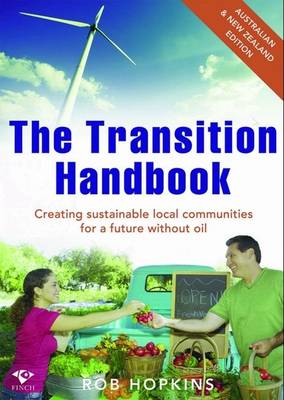- Home
- About
- Local groups
- Community
- News
- Resources
- Offer Support
- Contact us
The Transition Handbook
updated 12 Jun 2011
 This 240 page book from Rob Hopkins, is surely one of the most clearly written, inspiring, practical and usable books I have ever read. It will be of enormous assistance to people involved in, or interested in starting, a Transition Initiative.
This 240 page book from Rob Hopkins, is surely one of the most clearly written, inspiring, practical and usable books I have ever read. It will be of enormous assistance to people involved in, or interested in starting, a Transition Initiative.
If you want to read some of Rob's posts, or watch a promotional video about this book, here they are on www.transitionculture.org
And here are a couple of quotes from the book:
Resilience Central to this book is the concept of resilience. In ecology, the term resilience refers to an ecosystem’s ability to roll with external shocks and attempted enforced changes. Walker et al. define it thus: "Resilience is the capacity of a system to absorb disturbance and reorganise while undergoing change, so as to still retain essentially the same function, structure, identity and feedbacks." In the context of communities and settlements, it refers to their ability to not collapse at first sight of oil or food shortages, and to their ability to respond with adaptability to disturbance. The UK truck drivers’ dispute of 2000 offers a valuable lesson here. Within the space of three days, the UK economy was brought to the brink, as it became clear that the country was about a day away from food rationing and civil unrest. Increased resilience and a stronger local economy do not mean that we put a fence up around our towns and cities and refuse to allow anything in or out. It is not a rejection of commerce or somehow a return to a rose-tinted version of some imagined past. What it does mean is being more prepared for a leaner future, more self-reliant, and prioritising the local over the imported. What are
Transition Initiatives? "Scalable microcosms of hope." - Jeremy Leggett
Transition Initiatives are based on four key assumptions:
- That life with dramatically lower energy consumption is inevitable, and that it’s better to plan for it than to be taken by surprise.
- That our settlements and communities presently lack the resilience to enable them to weather the severe energy shocks that will accompany peak oil.
- That we have to act collectively, and we have to act now.
- That by unleashing the collective genius of those around us to creatively and proactively design our energy descent, we can build ways of living that are more connected, more enriching and that recognise the biological limits of our planet.
The future with less oil could, if enough thinking and design is applied sufficiently in advance, be preferable to the present. There is no reason why a lower-energy, more resilient future needs to have a lower quality of life than the present. Indeed, a future with a revitalised local economy would have many advantages over the present, including a happier and less stressed population, an improved environment and increased stability. Here is the first of two pages of the Table of Contents, you can click on this image to get a slightly larger version.
Order a copy of The Transition Handbook
You can purchase the recent Australasian version through on the Living Economies website.

Recent comments
16 weeks 5 days ago
39 weeks 4 hours ago
42 weeks 2 days ago
46 weeks 12 hours ago
49 weeks 6 days ago
1 year 3 days ago
1 year 3 days ago
1 year 12 weeks ago
1 year 29 weeks ago
1 year 41 weeks ago